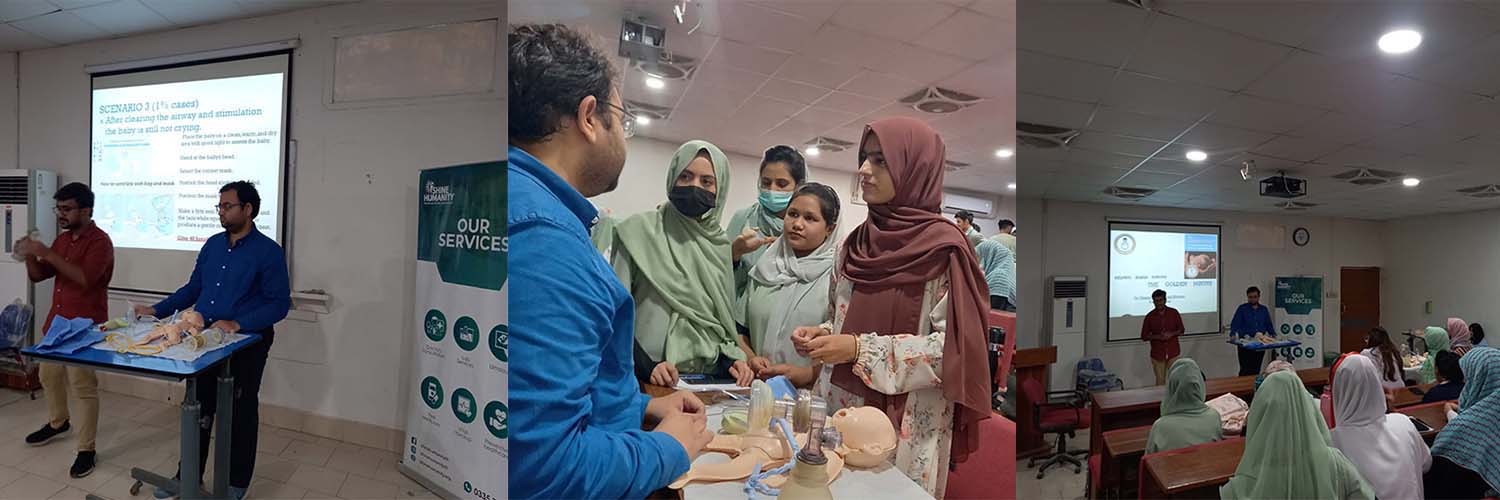How Can Training Programs Reduce the Risk of Infant and Neonatal Mortality?
Unfortunately,
Pakistan is one of those countries suffering from a high neonatal mortality
rate. Not only a few, but a huge list of factors are the reasons behind it.
Some common causes include premature births, birth defects, delivery
complications, untrained midwives, home births, poor healthcare system, and so
on.
To address this
alarming issue, there is a dire need to educate women and spread awareness.
Especially in rural areas, where the literacy rate is low, and the trend of
home births is high, awareness and education can make a huge difference.
One such initiative
was taken by Shine Humanity. We arranged a workshop for
training doctors, nurses, and midwives in rural communities about neonatal
care. Our focus was to teach them techniques that medical professionals use
when a newborn faces breathing difficulty.
If these training
programs are arranged regularly, reducing the mortality rate in neonates and
infants will not be difficult. Let us see how these programs can help:
Help in Understanding the Risk of
Traditional Baby Care Rituals
Due to a lack of
knowledge, people in rural areas follow many rituals that can sometimes cause
harm to newborns. The traditional practice of using various substances for the
healing of the umbilical cord is common. Since the umbilical cord is cut, it is
often the first point of infection, but nonprofessional healthcare providers
often ignore it.
Untrained midwives and
mothers use substances like cow dung, surma, ash, and ghee in this area which
increases the risk of sepsis, resulting in severe complications. Apart from it,
delaying breastfeeding and not knowing the right breastfeeding positions also
cause various problems. Giving water or honey to newborns is another practice
that can be addressed by spreading awareness about the drawbacks.
Highlight the Dangers of Home
Births
Compared to hospital
births, home births can result in death, nervous system disorders, and
seizures. But women in rural areas have a fear of cesarean delivery. They have
a misconception that most hospital deliveries are C-sections and the cost is
too high. Since people in these areas hardly meet their basic needs, they don’t
consider hospital deliveries the right option.
With training and
workshops, you can educate medical professionals and mothers about natural
deliveries in hospitals. You can also highlight how home births can result in
neonatal deaths and give rise to other complications. Well-equipped government
hospitals can provide this facility.
Identify Health Complications in
Neonates and Infants
Another common problem
is the lack of knowledge regarding symptoms of health complications in infants
and neonates. For instance, many mothers and even midwives do not know the
signs of breathing difficulties. They do not consider it essential to check the
respiratory rate when a child is constantly crying for a long time and
producing a wheezing sound, a musical sound coming from the chest. Besides
this, they do not prioritize a detailed health checkup during the first year of
a child.
Sometimes, symptoms do
not show, but sudden infant death syndrome (SIDS) can occur. Training programs
educate people about these symptoms as well as their prevention. Through these
campaigns, people also get to know the cause of SIDS. Knowing these causes
helps eradicate certain habits like alcohol consumption, early marriage,
improper infant safety measures, etc.
Help in Knowing the Importance of
Vaccinations
Rural communities
often misunderstand the concept of vaccinations. They have beliefs about the
side effects and are usually hesitant about childhood vaccines. Even mothers
dealing with contagious diseases like Hepatitis are not willing to opt for
vaccination of the same illness for their newborns.
Similarly, some people
do not know the institutions from which they can get the vaccines for free.
There are other problems, too, like transportation or lack of vaccine stock in
the area.
Workshops and training
programs spread awareness regarding the significance of vaccines. These
campaigns train people to convince their community to get childhood
vaccinations and seek help if appropriate vaccines are unavailable. Medical
health teams also learn multiple techniques for providing vaccinations to those
in need. They can teach people about the role of vaccines, promise no side
effects, and show them evidence of others who got the vaccine in the
past.
Highlight the Consequences of Poor
Hygiene
Due to illiteracy and
lack of exposure, women and men in underdeveloped areas do not know the
importance of hygiene and cleanliness. At the time of birth, lack of hygiene
and poor environmental conditions can result in getting many infections. These
infections can also become life-threatening and equally affect the health of a
mother and a child.
When you train medical
teams and make them aware of the complications that can arise due to poor
hygiene, they take appropriate steps. Proper sterilization of equipment, hand
sanitization, use of hand gloves, and other practices become common. These
steps of hygiene and cleanliness help in staying safe from infectious
diseases.
Create a Health-Conscious
Community
Underdeveloped
communities where child health, hygiene, and disease prevention are not a
priority turn into a health-conscious community through training programs.
These sessions empower medical professionals and their teams with the latest
neonatal and infant care knowledge.
When people observe a
positive change in medical clinics and hospitals, they realize the significance
of health and adopt positive measures for their child’s health. Consequently,
it builds an environment of a healthy community.
Final Thoughts
The above points
highlight the core reasons behind infant and neonatal mortality in underserved
areas. Training programs bring a huge difference in empowering these
communities with healthcare knowledge. They help control the causes like early
marriage, unhygienic surroundings, home births, etc.
You can play a part in arranging these training programs. Donate or share your skills with Shine Humanity to train medical professionals in rural areas.
